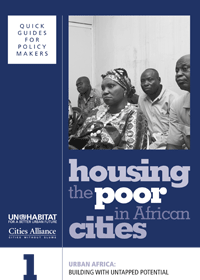
The situation is especially dire for the poorest residents of African cities; the number of evictions of the urban poor from their neighbourhoods is growing, and many are located in peripheral areas far from employment centres.
A new tool produced by UN-HABITAT aims to help national and local officials as well as policy makers in African cities improve their understanding of low-income housing issues so that they can make informed policy decisions that benefit the poor.
The Quick Guides for Policy Makers: Housing the Poor in African Cities series is a set of eight concise, user-friendly guides, each one addressing a different topic related to low-income housing. The series is not aimed at specialists, but instead serves as a quick tool to provide a basic understanding of low-income housing issues.
These Quick Guides are based on a successful series on Housing the Poor in Asian Cities, which was published jointly by UN-HABITAT and the United Nations Economic and Social Commission for Asia and the Pacific (UNESCAP) in 2009.
The African version, which was written by a team of experts from the African Centre for Cities (ACC), has been adapted to the realities and contexts of Sub-Saharan African countries. Cities Alliance supported the production of the African series.
Overview of the Quick Guides
- Quick Guide 1- Urban Africa. Proposes a range of policy and action frameworks that can steer urban development in positive directions, using the resources of knowledge and experience that exist within urban communities across Africa.
- Quick Guide 2 - Low-Income Housing. Describes several ways of addressing low-income housing in African cities at the programme and project level. It focuses on well tried methods of improving the housing and living environments of people living in slums and informal settlements, and providing adequate housing for future generations of urban poor.
- Quick Guide 3 - Land. Looks at the different forms of land tenure which operate in African cities and examines some of the problems and benefits of these different land tenure systems.
- Quick Guide 4: Eviction. Explores how communities facing eviction have organised themselves and drawn on the support of community-based networks and institutions in Africa and globally to find alternatives to the destruction of their settlements. The guide presents guidelines to help governments and policy makers to develop better formal procedures to minimise evictions and to ensure that resettlement, if inevitable, follows international standards
- Quick Guide 5: Housing Finance. Introduces some of the key concepts of housing finance and provides a quick overview of how a housing finance system works. It also addresses how to integrate formal and informal housing finance systems and offers tips for policy makers to enhance access to affordable housing finance, especially by the urban poor.
- Quick Guide 6: Community-Based Organisations. Considers how governments and policy makers can work together with community-based organisations to address the problems that poor people experience in urban settlements and find viable long-term solutions to their housing needs.
- Quick Guide 7: Rental Housing. Considers the characteristics of good quality rental housing and sound landlord-tenant rental arrangements, and presents policy options to promote and regulate the expansion of rental housing (especially for the urban poor).
- Quick Guide 8: Local Government. Provides a brief overview of local government in Africa, and the urban challenges (and opportunities) to which local government bodies need to respond. It also shows how physical development, economic development and social development need to go hand in hand in order for interventions to be effective and sustainable and presents some key tools for local governments to use when adopting these approaches.




